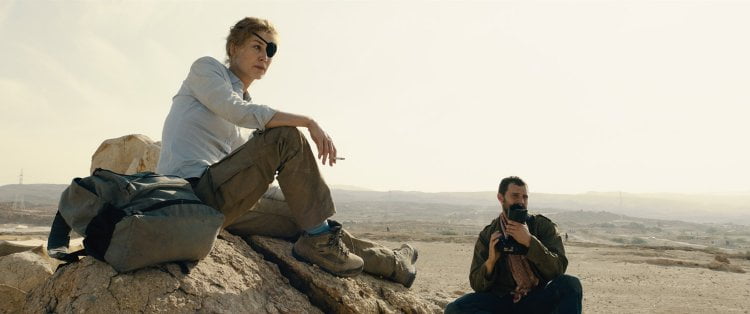A Private War

For ten years from a humanitarian crisis in Sri Lanka to the devastation in Syria, London's Sunday Times war correspondent Marie Colvin (Rosamund Pike) became increasingly worn down by the horrors she'd witnessed, suffering from PTSD. Yet even after beginning a romance with businessman Tony Shaw (Stanley Tucci), she found herself drawn back to unearthing these stories in "A Private War."
Laura's Review: B
In his feature debut, documentarian Matthew Heineman's ("Cartel Land") wrestles with a disjointed, episodic screenplay by Arash Amel ("Grace of Monaco"), his film growing stronger as it goes along. Adapted from a Vanity Fair article by Marie Brenner that paints a far clearer portrait of its subject, the film is less a standard biopic than a portrait of the psychological effects of continued exposure to trauma as experienced by the award winning American journalist. Rosamund Pike's gritty, fearless yet vulnerable performance does justice to Colvin even though she's often battling suspect dialogue. Although she began her career in 1986, the film covers Colvin's last 10 years, beginning with her insistence on covering the Sri Lankan story against editor Sean Ryan's (Tom Hollander) wishes. She gets her harrowing scoop at the cost of a grenade which blinds her left eye, an injury she covered with her signature sexy eye patch. She receives the British Journalist of the Year award for her efforts, but her (composite) ex-husband, David Irens (Greg Wise), lashes out at her rash behavior. 'You were so beautiful,' he says, stomping on the glow of her celebration. Given that her experiences are already affecting her when the film begins, at first Colvin's behavior comes across as somewhat diva-ish, a problem some earlier grounding would have rectified. Frequent flashbacks inform her mental state, particularly the sight of a young Middle Eastern girl laid out in death, her meaning a mystery until Marie mentions her in the film's last act (why was this, clearly establishing trauma, not included?). The film begins to cohere with Colvin's 2003 trip to Iraq, where she hopes to find a mass grave (she does, and it is shattering). It is here that we begin to get a sense of how Colvin operated as she blithely ignores a U.S. press briefing and picks up the freelance photographer, Paul Conroy ("Fifty Shades of Grey's" Jamie Dornan), who would be at her side until her death, challenging his masculinity when he questions her aim of driving to Fallujah. We will follow these two to Afghanistan, Libya (where Colvin takes no prisoners interviewing Gaddafi) and Colvin's stint in a psychiatric hospital. She parties hard, pounding vodka martinis and attracting the attention of Shaw, who offers respite in sex and sailboat cruises in Antigua. We learn of her penchant for La Perla lingerie, even in the trenches, her habit of lighting one cigarette after another and of her personal Bible, Martha Gellhorn's 'The Face of War.' (Her presentation of the book to fellow journalist Kate Richardson (Faye Marsay), a thinly sketched character, is the film's weakest scene.) She is Auntie Marie to the children of her good friend Rita (Nikki Amuka-Bird), despairing of her inability to have her own (Colvin suffered two miscarriages). She states that her hardest obstacle is keeping enough faith in humanity that they will care about the people whose shattered lives she illuminates. Her own future stares her in the face as she views the bloodied body of colleague Norm Coburn (Corey Johnson). And it is in Homs, Syria, where Heineman's film achieves its greatest power, Marie defying everything to report on the 28,000 people being bombed by their own government while Assad claims only to be targeting terrorists. It is a true vision of hell, startling even if you've seen some of the countless documentaries on the subject. With Assad tracking cell phone signals and Internet connections, Colvin makes the decision to report live. Her conversation with CNN's Anderson Cooper will be her last. While the film is flawed, its realistic depictions of the dangers and horrors war correspondents endure to report on-the-ground truths couldn't have arrived at a better time to honor a media under constant attack by the right. Pike, with her gravelly American accent and shellshocked bravado, honors an extraordinary woman. Grade:
Robin's Review: DNS
DNS

